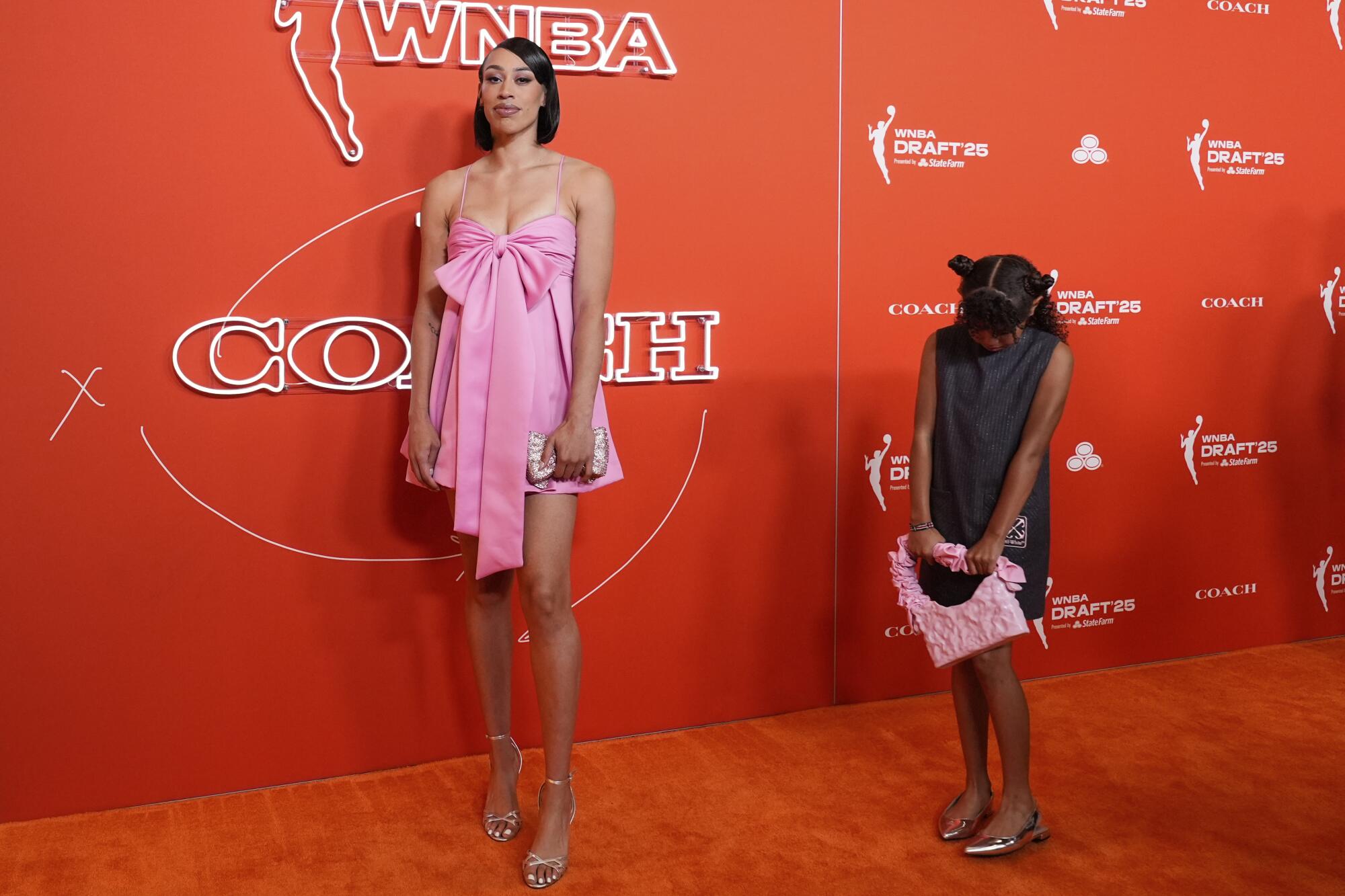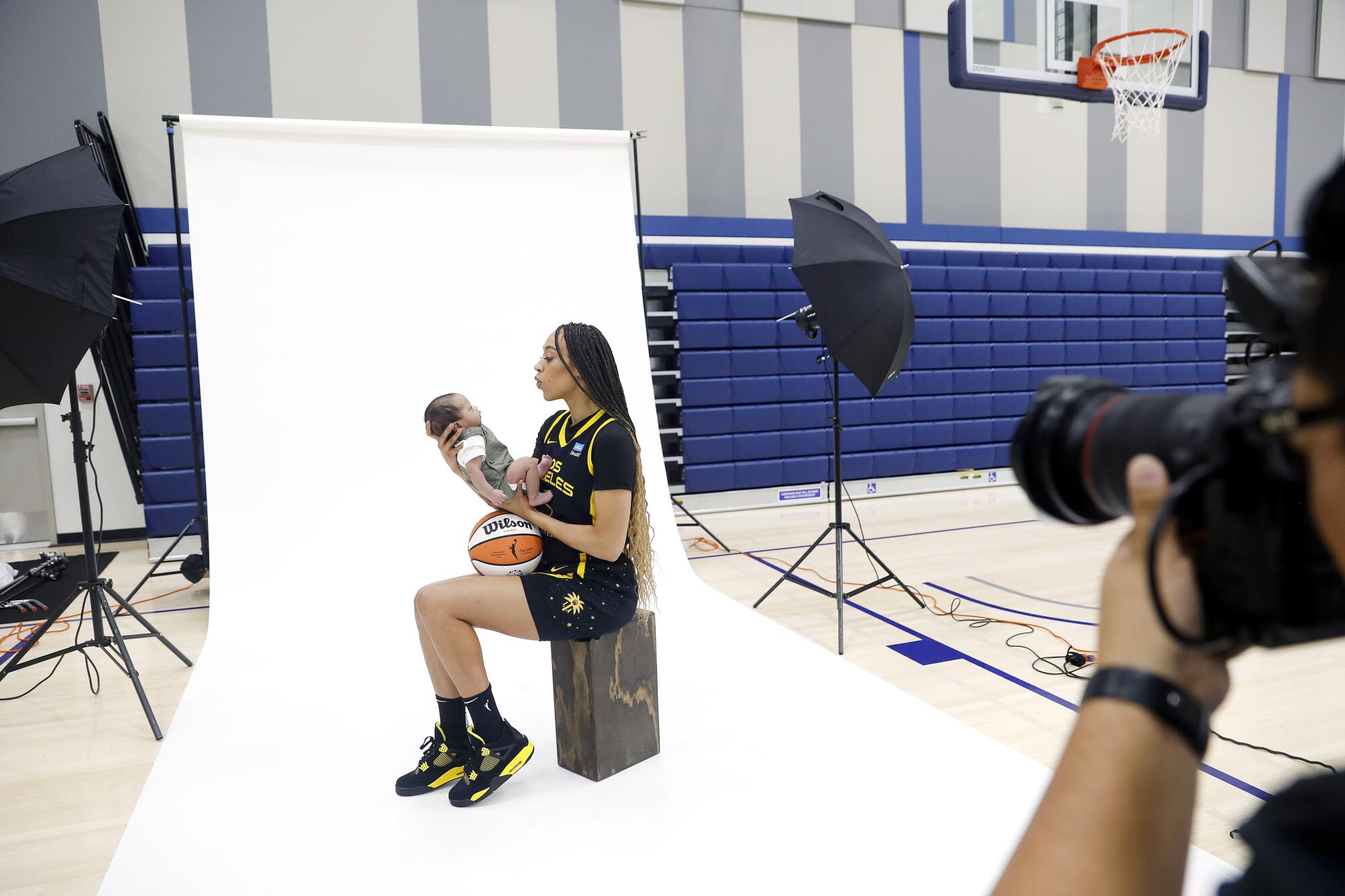
- Share via
Even on Mother’s Day — the day dedicated to relaxation and pampering for moms — the Sparks will take the hardwood in Torrance, sweating through defensive sets, refining footwork and hitting jumpers.
It’ll be a shortened practice, but practice nonetheless. There’s no time to pause. The WNBA season opener is less than a week away. The grind of pro basketball never lets up, and neither does the grind of motherhood.
Odyssey Sims’ latter role often kicks in when she steps off the court. When the final whistle sounds, her 5-year-old son, Jaiden, usually waits nearby — her best friend, “Mama’s baby.” He shares her wide grin. They move as one, even at the Sparks’ training camp.
“I’m used to bringing my son with me all the time,” Sims said. “He loves coming to the gym. … He has his moments where he’s like, ‘Mom, I’m ready to go.’ I’m like, ‘Son, it’s 10 o’clock, we haven’t even started.’”
Balancing a career and family requires strategy, support and sacrifice — a daily reality for moms nationwide. For Sparks players Sims, Dearica Hamby, Emma Cannon and Maria Kliundikova, that balancing act plays out under the public eye and pressure of elite competition.
With limited hours in the day and demands pulling from all sides, the two worlds inevitably intersect. Children at practices and games are common, as are FaceTime calls squeezed in during late-night hotel stays.

“There’s a lot of pressure,” said head coach Lynne Roberts, who has two twin boys, 9-year-olds Miles and Henry. “To be as good as they are, it doesn’t just happen in practice. They’ve got to do it all the time and juggling being a mom, I’m in awe of them.”
Compared with most WNBA teams, the Sparks feature an unusually high number of mothers — a rarity in a league in which about 10% of the 156 active players are parents. For those few, having children reshaped their perspective on life, career and the game itself.
“They changed me, made me a better person,” Cannon said. “Life without them is crazy to even imagine. I’m grateful enough to even be called a mother.”
Cannon wears her children on her sleeve — literally. Her left leg is a canvas of tributes: Dior, her 3-year-old son, is inked behind her knee in flowing cursive. Above that, the initials of her newborn twins, Sage Ja’Nae and Suede Ja’Cole, are paired with their birth date. Crowning it all is a tender portrait — three small hands clasping hers, a portrait of family and togetherness etched in ink.
“All three were in the tattoo parlor with me when I got them done,” Cannon said.
At 35, Cannon is a 14-year basketball veteran — yet still a newcomer to parenting. She and her wife, Tia, had always discussed having children after basketball, but that reality came sooner than expected. As the seasons passed, the urge to wait faded. Before long, their family began to grow.

“Once we had Dior, we wanted him to have siblings because we were raised with siblings as well,” Cannon said. “So once that happened, God blessed us with twins.”
But amid the joy are the nonstop demands of a professional basketball career. Each player admits to feeling some degree of “mom guilt” — the emotional weight and anxiety of striving to meet the expectations of parenthood, even when they’re doing their best. That guilt intensifies under the strain of juggling multiple roles, trying to give both their families and careers the attention they deserve.
“To be honest, I feel guilty whenever I don’t have my child,” said Sims, a single mom who finds comfort in bonding with Jaiden. “It’s guilt in a sense because I feel like you cherish every moment, kids are growing up fast. So that couple of hours away feels like a day, days sometimes feel like a couple of months.”
This feeling of guilt is not unique to Sims.
Cannon, too, felt the emotional weight of separation during the team’s first preseason game in San Francisco on Friday — her first time traveling this season without her newborn twins and son. The absence was disorienting, but regular calls home provided some comfort, allowing her to stay connected despite the distance.
At the heart of this guilt is often separation anxiety — a reality shaped by the travel demands of playing in the WNBA. The Sparks will play 24 games on the road this season, logging thousands of miles by air and ground. The team tries to minimize time away, typically flying out the day before a game and returning immediately after — unless they’re on an extended trip.
Yet, despite the best efforts to stay close, the distance is always deeply felt.
In the beginning, being apart was emotionally challenging for Hamby. She and her daughter share a deep bond, training and walking red carpets while matching outfits. When Hamby left for trips, Amaya would ask, “Why are you leaving? Why go?”
“Every day,” Hamby said, reflecting on the guilt. “Amaya is texting me like, ‘Come home.’”
But as Amaya has grown older, she’s become more understanding of her mother’s commitment to basketball.
Hamby also acknowledges that, despite the pressures of her job, being a professional athlete offers unique opportunities to be present in her children’s lives. In the offseason, she’s hands-on — packing lunches, getting them ready for school and showing up for every practice and game. It’s her way of making up for the time basketball takes away.
Sparks veteran Dearica Hamby has embraced mentoring teammate Rae Burrell, helping Burrell adapt to the frustration of being a reserve on a WNBA team.
For many, stepping away from their careers, even briefly, and especially during their prime, is a difficult decision, complicated by the perception that motherhood and athletic success can’t coexist.
While the WNBA’s collective bargaining agreement provides some rights and benefits for players with children, many still measure progress against how far they’ve yet to go. Despite protections, players continue to face skepticism from coaches, teams and sponsors, with their commitment questioned simply because they chose to have a family.
Hamby acknowledges that the league has become more supportive of players with a family — a shift from when she had her first child, Amaya, eight years ago. Back then, she felt supported by the then-San Antonio Stars, from coaches to the front office. However, her second pregnancy revealed the challenges that still remain.
After announcing she was expecting her second child, Legend, during the Las Vegas Aces’ 2022 championship parade, Hamby said tensions grew with the organization. She believes her subsequent trade to the Sparks in January 2023 was retaliation for her pregnancy. This allegation prompted a WNBA investigation.
The league determined the Aces violated rules on impermissible player benefits, resulting in the forfeiture of their 2025 first-round draft pick. Head coach Becky Hammon was also suspended for two games without pay “for violating league and team Respect in the Workplace policies.”
In August, Hamby filed a lawsuit against the Aces and WNBA, alleging team officials questioned her commitment and implied she had agreed not to become pregnant during the term of her contract extension. Before her trade, Hamby publicly shared on social media that the ordeal left her feeling “lied to, bullied, manipulated and discriminated against.

“There’s this misconception — and times are starting to change — but the narrative is still there that you can’t do both, can’t be a successful parent and be successful at your career at the same time,” Hamby said, addressing the stigma that motherhood compromises commitment. “In our sport, you’ve seen that reality change. … My story is an example of that — and so many more moms.”
Sims’ experience was a bit more positive. While with the Minnesota Lynx, Sims became pregnant before the 2020 season and waited several months before telling her head coach, Cheryl Reeve, of her pregnancy in the offseason. Reeve and the organization responded with support, opting not to make the news public and leaving it up to Sims to decide when she wanted to share it.
Neither Sims nor Hamby missed the season after giving birth.
Sims had Jaiden in April 2020, just before the start of the bubble season. After recovering from a cesarean section and sitting out for two months to allow her stitches to heal, she returned to play two weeks into the season in August.
Hamby gave birth to Amaya in February 2017 and was back on the court six weeks later. When Legend was born in March 2023, she halved her recovery time, returning after three weeks — one of the few players in league history to give birth twice and return to play.
Even with her negative experience, Hamby has noticed a growing shift in support under the current CBA, which is set to expire after this season. This includes the improvement of benefits for current and future mothers, aimed at supporting them through different stages of family planning and parenthood.
Players are guaranteed their full salaries while on maternity leave. Teams provide two-bedroom units for players living with their children under 13, and nursing mothers are entitled to “comfortable, safe, private” accommodations.
After being acquired by the Sparks in a blockbuster trade, Kelsey Plum is ready to put words into action during her first season in L.A.
Family planning benefits are offered to players who choose to focus on their careers during their prime competitive years, postponing children until their late 20s or early 30s. Players with at least eight years of service are eligible to receive up to $20,000 annually — with a lifetime cap of $60,000 — to help cover fertility services such as egg freezing and infertility treatment, as well as adoption or surrogacy.
Still, Hamby feels the agreement isn’t without flaw. Currently, these benefits are only available during a player’s active career. Hamby hopes to see pregnancy-related support extended to include recently retired players — particularly for veterans who chose to prioritize their careers and start families later.
“There are people that want to have kids and they want to do it when they’re done playing, and it’s counterintuitive,” Hamby added. “They think, ‘Hey, we give you these benefits while you’re playing, but when you’re done playing, they’re no longer accessible.’ I don’t think that’s right, because when you decide to do it while you’re playing, you’re frowned upon.”
Additionally, fertility benefits remain out of reach for many: Heading into this season, only 38 players meet the eight-year service threshold, and just 12 have played 11 or more seasons — enough to access the maximum reimbursement. She expects that to change with a new contract.
Other financial increases, particularly regarding childcare, would be a welcome sight for players.
“More money for nannies, man,” Cannon said emphatically. “That $5,000 — that’s one thing I feel has to change, especially if you have multiple children.”
Currently, the childcare stipend is capped per household rather than per child — a limitation that doesn’t reflect the true cost of care. The average weekly cost of a nanny is $827, while daycare averages $343 per week, according to a nationwide survey by the caregiving site Care.com. In high-cost cities like L.A., those numbers are among the highest.

Avoiding the thought of out-of-pocket costs when asked, Cannon added with a laugh, “Oh, man, I don’t even want to talk about it.”
The goal is that the next CBA will strengthen support for mothers across the board. That push comes as women’s basketball is projected to generate more than $1 billion globally in 2025, driven by new media rights deals and an uptick in ticket and merchandise sales, according to a March report from financial services and consulting firm Deloitte.
For now, life as a WNBA mother remains a patchwork of challenges and triumphs. Despite the ongoing tug-of-war, none regret embracing motherhood. And when practice ends, each will head off to different Mother’s Day activities. Some have brunch reservations, while others have scheduled photo shoots or nail appointments. Regardless of the activity, the children remain by their sides.
“Being a professional athlete and a mother at the same time has its challenges,” Sims said. “But when you look at your kid every day, when you wake up and realize you’re a parent, it just makes everything worth it.”






